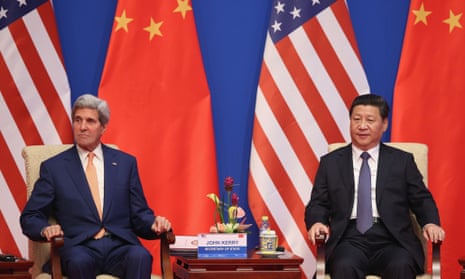Chinese president Xi Jinping has decided to skip a meeting of world leaders on climate change in New York, according to climate insiders, casting doubt on the summit’s potential to make progress ahead of next year’s major UN climate summit in Paris.
President Xi had been expected to attend the 23 September summit called by the UN Secretary General Ban Ki-moon, but is now set to send another senior Chinese politician in his place, though Beijing officials are yet to confirm this.
The news will be a blow to summit organisers, coming swiftly after the announcement that Indian prime minister Narendra Modi will also miss the meeting. Modi is scheduled to go to New York on 26 September and his decision not to advance his trip by three days to appear at the informal climate summit has created further paralysis among bureaucrats. Most of them do not even know if the environment minister is planning to go instead.
In this situation, the statement issued after the recent New Delhi meeting of environment ministers from BASIC (Brazil, South Africa, India and China) countries assumes added significance. The joint statement stuck to the long-held stand of developing nations.
Since then, there have been reports in India about alleged attempts by industrialised countries to woo Philippines away from the Like Minded Developing Countries (LMDC) group. Other members of the group include India, China, Cuba, Venezuela, Argentina, Nicaragua and Saudi Arabia.
During last year’s UN climate summit in Warsaw, Philippines took a leading position in this group by pressuring industrialised countries to live up to their commitments to mitigate emissions and help poorer nations tackle climate change effects. This position was strengthened because that summit was held in the immediate aftermath of Typhoon Haiyan, which devastated large areas in the Philippines.
UN Secretary General Ban Ki-moon’s informal summit comes as climate negotiations are heating up because a comprehensive global treaty to tackle climate change is expected by the end of 2015. Industrialised countries – led by the US and the European Union – are pressing for all 192 nations to take on legally binding obligations to rein in greenhouse gas emissions. India has so far opposed this strongly.
At a negotiating session of the UN’s climate secretariat this June, on behalf of LMDC the Venezuelan delegation submitted a draft of what the global climate deal should contain, a draft that was promptly opposed by negotiators from many industrialised countries. Indian negotiators now say they are waiting to see the draft being prepared by the UN Framework Convention on Climate Change secretariat. They want this ready before the next UNFCCC summit – scheduled in Lima this December – so that every government has a year to negotiate before the 2015 deadline.
Leaders of climate NGOs that regularly shadow the UNFCCC summits are apprehensive because they have heard the French government is preparing its own secret draft – the 2015 summit will be held in Paris – just the kind of activity that led to a fiasco at the 2009 summit in Copenhagen. Negotiators from most developing countries are keen to see a public draft months before the deadline.
The UN Secretary General’s informal summit is being held against this backdrop, with the hope that heads of government will provide some much-needed political impulse to the negotiations.
Led by US President Barack Obama, many heads of industrialised nations are expected at the summit. The absence of China and India at the highest level will take some of the sheen off, but they can possibly come back on board if leaders of industrialised countries make serious commitments about what they are going to do to mitigate emissions and help developing nations. An expert group set up by the UN Secretary General has already given recommendations on how to finance a greener economic path for all countries.
The office of the UN Secretary General is bringing business and civil society leaders to meet the heads of state and government at the summit, hoping for announcements of new commitments and practical actions to address climate change. It will be the first time since the Copenhagen summit that a majority of world leaders will get together on the issue. Green NGOs are mobilising to hold street marches in New York and elsewhere to coincide with the summit.
Speaking ahead of the summit, Ban Ki-moon said: “Solutions exist and we are already seeing significant changes in government policies and investments in sustainable ways of living and doing business. The race is on, and now is the time for leaders to step up and steer the world towards a safer future.”

Comments (…)
Sign in or create your Guardian account to join the discussion